| His Excellency Meir Shlomo began a dream posting in Thailand in August 2017, returning to the country that captivated him and his wife during a backpacking trip here 40 years earlier. Not long after he joined Israel’s Ministry of Foreign Affairs (MFA), serving in El Salvador, Peru, Denmark, India and the United States. This friendly and articulate diplomat shared insights with The BigChilli on some of the extraordinary and pivotal events unfolding in his host country and throughout the world in recent years, including what he described as ‘tectonic changes’ in the Middle East. The Ambassador is also Israel’s Permanent Observer for the Economic Social Commission for Asia and the Pacific (ESCAP) and non-resident Ambassador to Cambodia. ‘Lucky to be here’“Being Israel’s Ambassador to Thailand has been an amazing experience and I feel privileged to be here. There’s a very long list of Israeli diplomats waiting to replace me,” he said smiling. “Both personally and professionally, my time here has been a kind of closure,” said the Ambassador, who plans to return to Israel and retire when his term ends in about a year. “My wife and I fell in love with Thailand when we came as backpackers many years ago, and I never thought at the time that I would return here one day as an Ambassador – it is more than I could wish for. We loved Thailand at that time and now we have a chance to know the country and the people in depth. To be here as a tourist is one thing; but living in Thailand is much more interesting, it gives you time to discover the geography, history, culture, and most importantly, to know the Thai people better. “In the time of COVID-19, Thailand is one of the safest places in the world to be. It has been very interesting to watch how the Thai people deal with this crisis. It is extraordinary. We thought we might see a lot of panic and hoarding of things like toilet paper, as was reported in other countries, but here people behaved very calmly and didn’t panic. |
| “Supermarkets functioned normally and so on. My wife and I really admired how Thai people conducted themselves. It is a lesson for everyone. “Everywhere you went, every store, in every shopping mall, everyone wore masks and observed social distancing. I think that is a big part of why Thailand has come through the corona crisis so well. “The most memorable event in my time here was the cremation ceremony of His Majesty King Rama IX at the end of October 2017. It was a really huge and poignant experience, as well as a very sad time. I was so impressed with the character of the Thai people. I was privileged to be present at the cremation ceremony and on the way to Sanam Luang, in front of the Palace, I remember seeing all the streets full of thousands of people crying and fully expressing their genuine sadness. I have never seen anything like this in my life. It was very touching. “Another memory is the unfolding story of the children trapped in Tham Luang Nang Non cave in northern Thailand, which also remain very vivid. The Israeli Prime Minister called and instructed me to find out what we could do to help. I went to the cave on a Saturday morning, July 7, 2018, with my Defense Attaché. We had a plan devised by the Israeli Navy as a possible solution. I met with the provincial governor, who was at that time in charge of the rescue efforts. It was very moving to see all the people at the site who came to help. Some of them were Israeli volunteers living in Thailand. |
“One of those volunteers was from an Israeli company that donated sophisticated communication equipment that was used during the first days of the crisis. (Later on, the divers installed landlines to communicate with the children). However, the governor told me that they were going to begin extracting the children from the cave the very next day because the water level had started to rise very quickly. They thanked me for the rescue plan we offered but said there was no time to bring all the equipment required from Israel.
“It was a very moving experience to be there and to observe firsthand the rescue efforts. The camp was full of volunteers; everyone wanted to help. We were happy that we could play a small part. Later on, the Thai Prime Minister organized an event at the Royal Palace to recognize all the people and the few countries involved in the rescue efforts and kindly invited me as the representative of Israel to attend.”
“It was a very moving experience to be there and to observe firsthand the rescue efforts. The camp was full of volunteers; everyone wanted to help. We were happy that we could play a small part. Later on, the Thai Prime Minister organized an event at the Royal Palace to recognize all the people and the few countries involved in the rescue efforts and kindly invited me as the representative of Israel to attend.”
Winds of change
The Ambassador was eager to talk about the historic agreements between Israel and three former adversaries – United Arab Emirates, Bahrain and Sudan.
“That’s a huge thing and unfortunately a lot of people don’t realize it yet. It’s nothing short of a tectonic change of the Middle East. Unfortunately, in some places around the world, the perception of the Middle East is still very dogmatic and outdated the same way it was 20, 30 or 40 years ago. It is not the same region.
“That the UAE, Bahrain and Sudan would come out in the open and normalize ties with Israel used to be absolutely unthinkable. But now these countries are signatories of an initiative to make peace with Israel, and I expect that more Arab countries will follow suit.
“The Abraham Accords Peace Agreement establishes peace between Israel, and the UAE and Bahrain. Now we have to ‘put the meat’ into it, which will include diplomatic relationships and establishment of embassies, as well as direct flights between the countries, commerce, high-tech and agricultural joint ventures, tourism etc. There is even a football match between the national teams, scheduled for next month. We are experiencing a full-scale normalization.
“The situation with Sudan is a little bit different. What we have is a statement of normalization, which we have to build on, at a slower pace.
“This proves something Israel has been saying for a long time. The Palestinian-Israeli issue does not need to obstruct the relationship between Israel and the Arab World.
“Palestinians have always tried to say that a resolution to the Palestinian-Israel conflict is a pre-condition to any peace agreement between Israel and any other Arab country. Well, we have never thought this should be the case. It started in 1979 when Egypt, the most important country in the Arab world, signed a peace treaty with Israel. Now we have had more years of peace with Egypt than we were formerly at war. Then Jordan followed Egypt’s lead and now we have UAE, Bahrain and Sudan joining in and we are not done.
“I think that the psychological effect of the agreement is equally important. The idea that the Palestinians can hold hostage any peaceful relationship between Israel and the Arab world has totally crumbled. It is not that we don’t want to solve the Palestinian issue. We do, and we recognize it is important. But the Palestinians have always wanted to avoid making difficult compromises and preferred to wait for somebody else to do the work for them – namely the Arab world or the international community.
“They don’t want any compromise that makes them pay any kind of price. Maybe now they will realize that time is not working for them and the Arab World is not going to wait forever. It is time for them to wake up and tell their people the truth, which is, that in order to get peace with Israel, they have to make some kind of compromise. Nobody is going to do the work for them.
“It is a new Middle East that has been crystallizing for a long time. A lot of commerce has been developed informally over the years between Arab countries and Israel, and more importantly, the interests of these countries are aligning with the same interests of Israel. They understand that Israel is not the enemy. Israel is actually an ally and a friend. Maybe not all of them want to sign a peace treaty with Israel out in the open, but most of them understand this reality.
“I would say that the Accords are more inclusive, and other countries are seriously thinking about joining in. This is the beginning of a wider peace process. We are very optimistic.”
Ambassador Shlomo said the reaction from the Arab world was encouraging. “UAE and Bahrain wouldn’t have signed without knowing that other Arab countries are backing this important step. Of course, some extremist countries, namely Iran, Syria, along with the Palestinians, have been highly critical. But those who really want to see peace in the world, and this includes Egypt, welcome it. Those who are only interested in instigating violence and terror, do not.
“These days, external observers of the Middle East should also understand this new reality. They should understand that if you look at the Middle East, you should look at it for what it is today, and not at what it was 40 years ago. The potential for greater commerce and new and more rewarding relationships is all there.
“Take aviation for example; if you shorten the duration of flights between Thailand and Israel by three, four or five hours, it creates a dramatic change. It has a huge effect on the ability to move people and merchandise. It is a new world of opportunities and I hope people will understand it. The length of the corridor between Israel and Southeast Asia is now getting shorter and Thailand is the gate. It will enable much more tourism and much more commerce.”
“That’s a huge thing and unfortunately a lot of people don’t realize it yet. It’s nothing short of a tectonic change of the Middle East. Unfortunately, in some places around the world, the perception of the Middle East is still very dogmatic and outdated the same way it was 20, 30 or 40 years ago. It is not the same region.
“That the UAE, Bahrain and Sudan would come out in the open and normalize ties with Israel used to be absolutely unthinkable. But now these countries are signatories of an initiative to make peace with Israel, and I expect that more Arab countries will follow suit.
“The Abraham Accords Peace Agreement establishes peace between Israel, and the UAE and Bahrain. Now we have to ‘put the meat’ into it, which will include diplomatic relationships and establishment of embassies, as well as direct flights between the countries, commerce, high-tech and agricultural joint ventures, tourism etc. There is even a football match between the national teams, scheduled for next month. We are experiencing a full-scale normalization.
“The situation with Sudan is a little bit different. What we have is a statement of normalization, which we have to build on, at a slower pace.
“This proves something Israel has been saying for a long time. The Palestinian-Israeli issue does not need to obstruct the relationship between Israel and the Arab World.
“Palestinians have always tried to say that a resolution to the Palestinian-Israel conflict is a pre-condition to any peace agreement between Israel and any other Arab country. Well, we have never thought this should be the case. It started in 1979 when Egypt, the most important country in the Arab world, signed a peace treaty with Israel. Now we have had more years of peace with Egypt than we were formerly at war. Then Jordan followed Egypt’s lead and now we have UAE, Bahrain and Sudan joining in and we are not done.
“I think that the psychological effect of the agreement is equally important. The idea that the Palestinians can hold hostage any peaceful relationship between Israel and the Arab world has totally crumbled. It is not that we don’t want to solve the Palestinian issue. We do, and we recognize it is important. But the Palestinians have always wanted to avoid making difficult compromises and preferred to wait for somebody else to do the work for them – namely the Arab world or the international community.
“They don’t want any compromise that makes them pay any kind of price. Maybe now they will realize that time is not working for them and the Arab World is not going to wait forever. It is time for them to wake up and tell their people the truth, which is, that in order to get peace with Israel, they have to make some kind of compromise. Nobody is going to do the work for them.
“It is a new Middle East that has been crystallizing for a long time. A lot of commerce has been developed informally over the years between Arab countries and Israel, and more importantly, the interests of these countries are aligning with the same interests of Israel. They understand that Israel is not the enemy. Israel is actually an ally and a friend. Maybe not all of them want to sign a peace treaty with Israel out in the open, but most of them understand this reality.
“I would say that the Accords are more inclusive, and other countries are seriously thinking about joining in. This is the beginning of a wider peace process. We are very optimistic.”
Ambassador Shlomo said the reaction from the Arab world was encouraging. “UAE and Bahrain wouldn’t have signed without knowing that other Arab countries are backing this important step. Of course, some extremist countries, namely Iran, Syria, along with the Palestinians, have been highly critical. But those who really want to see peace in the world, and this includes Egypt, welcome it. Those who are only interested in instigating violence and terror, do not.
“These days, external observers of the Middle East should also understand this new reality. They should understand that if you look at the Middle East, you should look at it for what it is today, and not at what it was 40 years ago. The potential for greater commerce and new and more rewarding relationships is all there.
“Take aviation for example; if you shorten the duration of flights between Thailand and Israel by three, four or five hours, it creates a dramatic change. It has a huge effect on the ability to move people and merchandise. It is a new world of opportunities and I hope people will understand it. The length of the corridor between Israel and Southeast Asia is now getting shorter and Thailand is the gate. It will enable much more tourism and much more commerce.”
Bilateral relations in the age of COVID
“For diplomats, the COVID-19 pandemic is a disaster. At the end of the day, diplomacy is all about personal relationships. When you cannot meet people face-to-face, it has a big effect on the majority of your daily tasks, as we are constantly meeting people, sitting with them, building relations and planning together. Zoom cannot take you very far into diplomacy, although it can serve some technical issues.
“Nevertheless, I must say that despite the difficulties, we did manage to sign two bilateral agreements with Thailand during the pandemic. One major agreement concerns the recruitment of Thai workers to agricultural work in Israel, which continued even during the pandemic. We are the first country that enabled Thai workers to arrive after the pandemic started, which helps with the unemployment situation here in Thailand.
“Since Thailand is considered a low-risk country in terms of COVID-19 infections, it was decided also when the workers arrive in Israel, they do not need to quarantine upon arrival. The second agreement is an aviation protocol that was signed in Jerusalem. Since COVID-19 started we needed to repatriate some of our
nationals in Thailand, mostly tourists who were stranded
here when the crisis struck and wanted to go home.
“We also had Israelis in other countries like Cambodia or Singapore who wanted to go home. Thailand became a rallying point for Israeli nationals in the region. They came to Thailand and were flown back home from here. This is a good opportunity for me to thank the Thai MFA, who were very helpful, and also, the Civil Aviation Authority of Thailand.
“Thailand and Israel have enjoyed an extremely good and mutually rewarding relationship for a very long time. As for trade, Thailand exports to Israel mainly fully assembled cars and electronics products. My Toyota car in Israel was made in Thailand. We export to Thailand, agricultural technology and high-tech products, meaning software and cyber as well as chemicals and diamonds. COVID-19 doesn’t really affect the trade between our countries.
“One good thing that resulted from the pandemic is that since it’s quite hard to leave the country I started to travel more inside Thailand. We’ve found a lot of very nice and interesting places we’d never heard of before, especially some islands. We even explored new places that even some of my Thai friends didn’t know about, like Ko Muk in Trang province. Before the crisis we had already visited many places in the North, like Chiang Mai, Chiang Rai and Mae Hong Son, so we decided to go to the South this time, and we enjoyed it very much.”
“Nevertheless, I must say that despite the difficulties, we did manage to sign two bilateral agreements with Thailand during the pandemic. One major agreement concerns the recruitment of Thai workers to agricultural work in Israel, which continued even during the pandemic. We are the first country that enabled Thai workers to arrive after the pandemic started, which helps with the unemployment situation here in Thailand.
“Since Thailand is considered a low-risk country in terms of COVID-19 infections, it was decided also when the workers arrive in Israel, they do not need to quarantine upon arrival. The second agreement is an aviation protocol that was signed in Jerusalem. Since COVID-19 started we needed to repatriate some of our
nationals in Thailand, mostly tourists who were stranded
here when the crisis struck and wanted to go home.
“We also had Israelis in other countries like Cambodia or Singapore who wanted to go home. Thailand became a rallying point for Israeli nationals in the region. They came to Thailand and were flown back home from here. This is a good opportunity for me to thank the Thai MFA, who were very helpful, and also, the Civil Aviation Authority of Thailand.
“Thailand and Israel have enjoyed an extremely good and mutually rewarding relationship for a very long time. As for trade, Thailand exports to Israel mainly fully assembled cars and electronics products. My Toyota car in Israel was made in Thailand. We export to Thailand, agricultural technology and high-tech products, meaning software and cyber as well as chemicals and diamonds. COVID-19 doesn’t really affect the trade between our countries.
“One good thing that resulted from the pandemic is that since it’s quite hard to leave the country I started to travel more inside Thailand. We’ve found a lot of very nice and interesting places we’d never heard of before, especially some islands. We even explored new places that even some of my Thai friends didn’t know about, like Ko Muk in Trang province. Before the crisis we had already visited many places in the North, like Chiang Mai, Chiang Rai and Mae Hong Son, so we decided to go to the South this time, and we enjoyed it very much.”
That the UAE, Bahrain and Sudan would come out in the open and normalize ties with Israel used to be absolutely unthinkable. But now these countries are signatories of an initiative to make peace with Israel, and I expect that more Arab countries will follow suit.
Expression of gratitude
“As you can imagine since diplomacy is about building relationship, I have met so many Thai people during the last three years in Thailand, be it on a professional capacity or on a social capacity.
“I also think that part of my job is getting to know the country and its people in Bangkok and outside of Bangkok. Since both my wife and I like travelling, it has been an interesting and joyful experience exploring the different provinces of Thailand.
“Everywhere we went during these years, we met kind people who always tried to help and share. It may be true that some of it may have been because I’m an Ambassador, but in countless times, it happened when we just went around privately in the markets or in other different places, and found out that Thailand is indeed the land of smiles.
“Yes, Thailand has amazing mountains. Yes, Thailand has amazing shrines. Yes, Thailand has amazing islands. But for us, it is the people of Thailand that made us fall in love with this wonderful country.”
“As you can imagine since diplomacy is about building relationship, I have met so many Thai people during the last three years in Thailand, be it on a professional capacity or on a social capacity.
“I also think that part of my job is getting to know the country and its people in Bangkok and outside of Bangkok. Since both my wife and I like travelling, it has been an interesting and joyful experience exploring the different provinces of Thailand.
“Everywhere we went during these years, we met kind people who always tried to help and share. It may be true that some of it may have been because I’m an Ambassador, but in countless times, it happened when we just went around privately in the markets or in other different places, and found out that Thailand is indeed the land of smiles.
“Yes, Thailand has amazing mountains. Yes, Thailand has amazing shrines. Yes, Thailand has amazing islands. But for us, it is the people of Thailand that made us fall in love with this wonderful country.”
CV of H.E. Mr Meir Shlomo
Academic Education
• 2014: PhD (summa cum laude) University Paris 8.
• 1987: MA (cum laude) Mass Communications, Hebrew University, Jerusalem.
• 1983: BA (cum laude) Political Science, Tel Aviv University.
Professional Experience
• 2014-2017: Head of the North American Division at the Ministry of Foreign Affairs (MFA).
• 2010-2014: Ambassador and Consul General and Head of the Israeli Mission, Houston, Texas, USA.
• 2007-2010: Adviser on Strategic Affairs to the
Division of Public Diplomacy at the MFA.
• 2002-2006: Consul General and Head of Mission,
New England, USA.
• 1998-2002: Head of Public Diplomacy at the MFA.
• 1995-1998: Deputy Chief of Mission (DCM) of the Embassy of Israel, India.
• 1992-1995: DCM of the Embassy of Israel, Denmark.
• 1989-1992: Head of Liaison Office for Academic Affairs at the MFA.
• 1987-1989: DCM of the Embassy of Israel, Peru.
• 1984-1987: DCM of the Embassy of Israel, El Salvador.
Remark: This interview was conducted on November 2.
• 2014: PhD (summa cum laude) University Paris 8.
• 1987: MA (cum laude) Mass Communications, Hebrew University, Jerusalem.
• 1983: BA (cum laude) Political Science, Tel Aviv University.
Professional Experience
• 2014-2017: Head of the North American Division at the Ministry of Foreign Affairs (MFA).
• 2010-2014: Ambassador and Consul General and Head of the Israeli Mission, Houston, Texas, USA.
• 2007-2010: Adviser on Strategic Affairs to the
Division of Public Diplomacy at the MFA.
• 2002-2006: Consul General and Head of Mission,
New England, USA.
• 1998-2002: Head of Public Diplomacy at the MFA.
• 1995-1998: Deputy Chief of Mission (DCM) of the Embassy of Israel, India.
• 1992-1995: DCM of the Embassy of Israel, Denmark.
• 1989-1992: Head of Liaison Office for Academic Affairs at the MFA.
• 1987-1989: DCM of the Embassy of Israel, Peru.
• 1984-1987: DCM of the Embassy of Israel, El Salvador.
Remark: This interview was conducted on November 2.

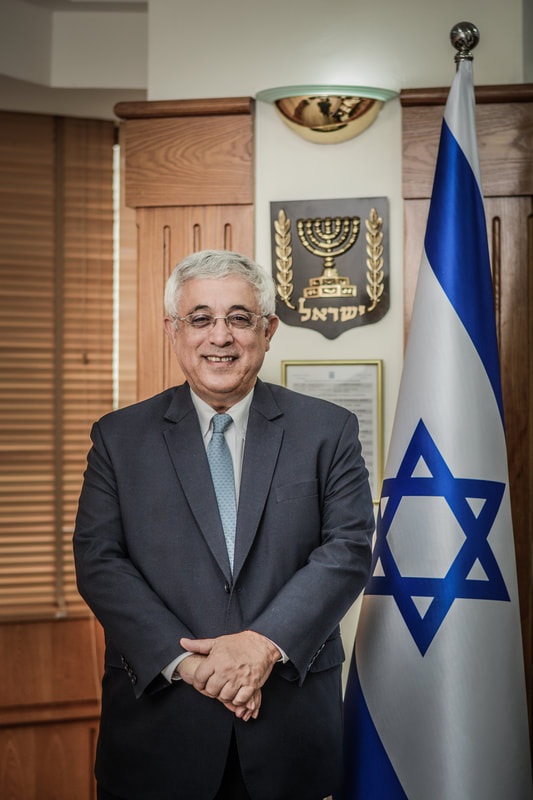
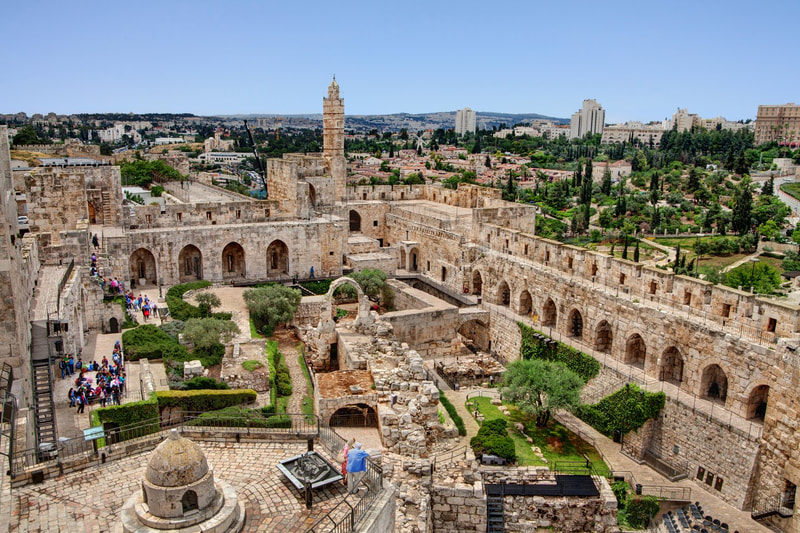
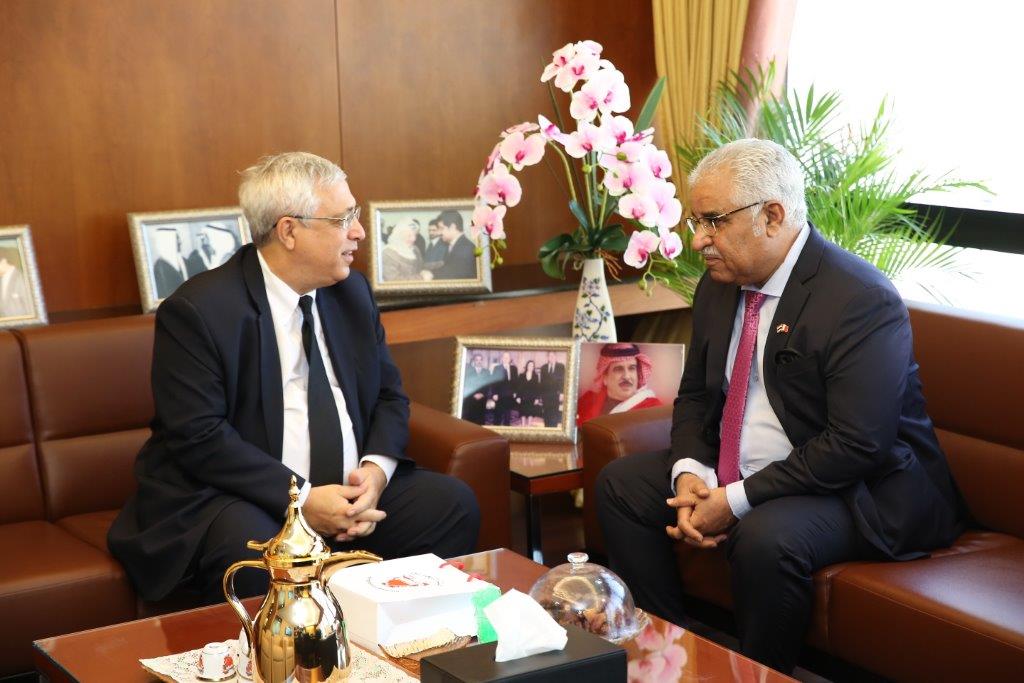
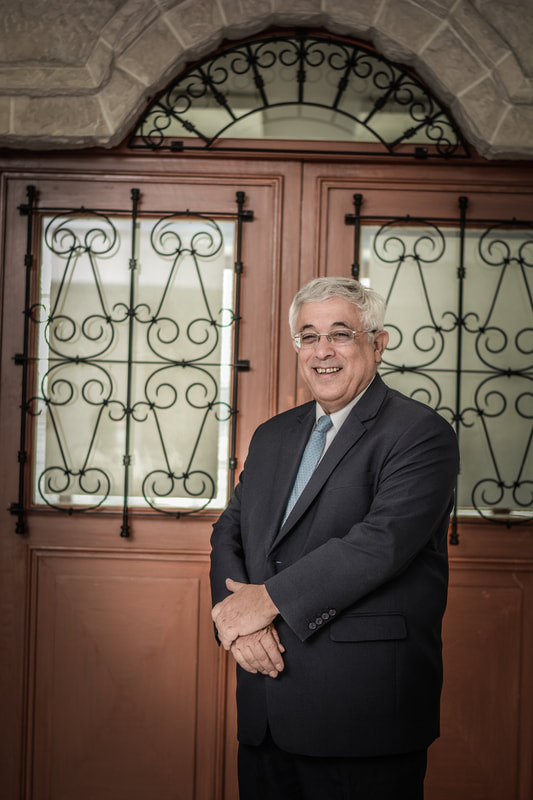
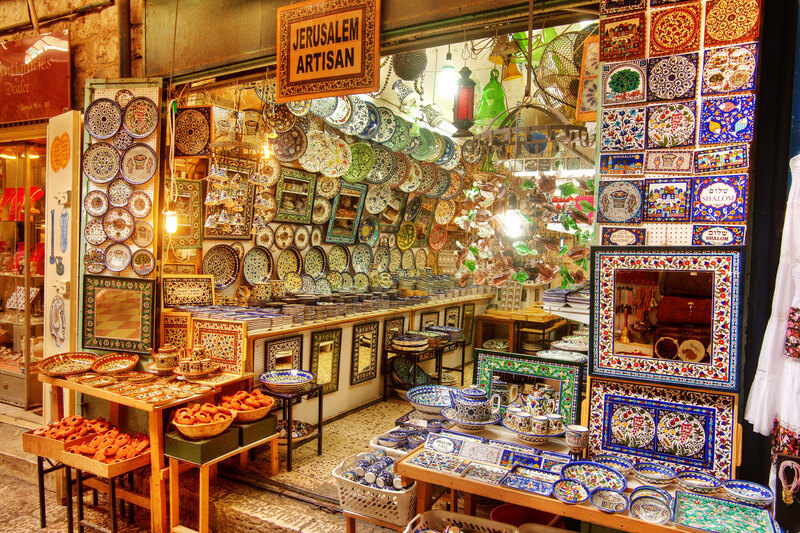
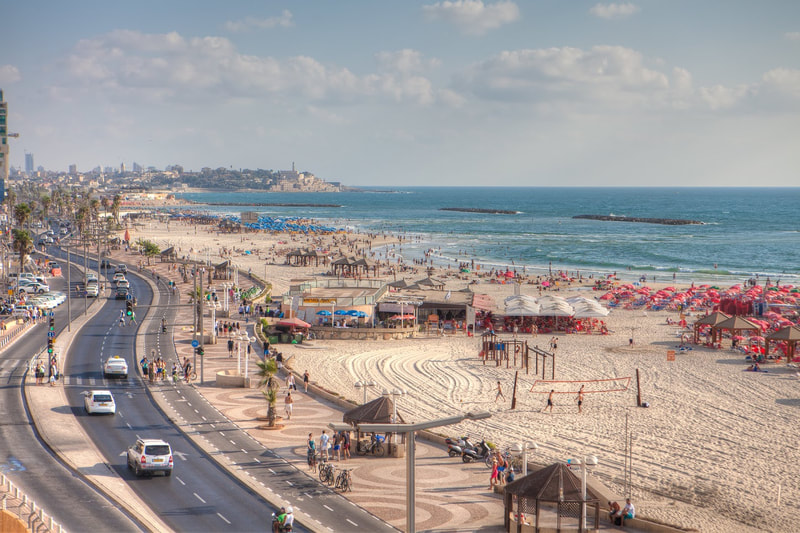
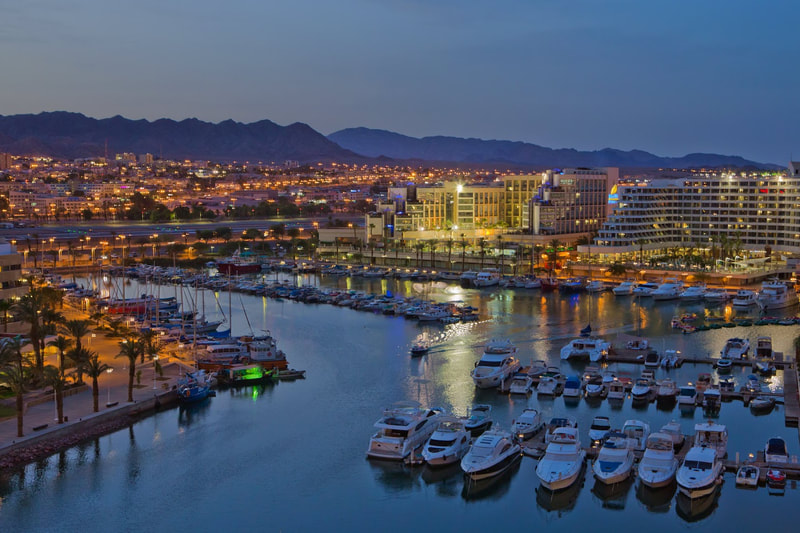
 RSS Feed
RSS Feed
















